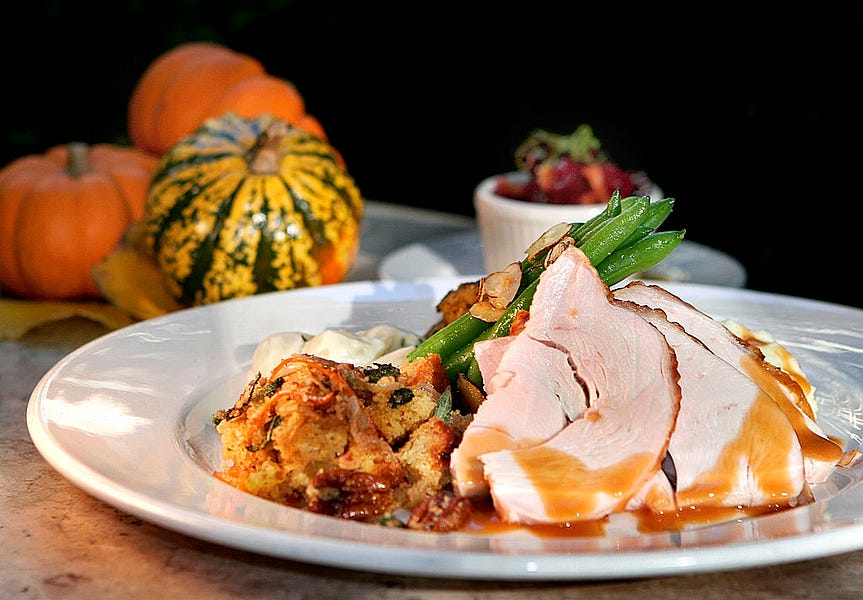Thanksgiving Quick Hits
Comments Section: We are thankful for you, dearest Sweep reader. The comments on the website each week inspire me to be better, think more deeply, and question everything. In politics, it’s often seen as cool to be cynical. It reminds me of those kids in high school who would brag about how ignorant they were of, you know, math. But there’s no excuse for it in politics.
If you ever get the chance, go to the Lincoln Memorial when you’re in town. Walk inside. Look around. Somewhere between the Gettysburg Address and the Second Inaugural, you will inevitably see a family—even late at night. They could have gone to Disney World or the Mall of America. But instead, they spent their time and money to come to their nation’s capital so that they could pass on this legacy to their children—its imperfections, its triumphs.
In America, skepticism is our birthright. But cynicism should be roundly mocked by those who truly understand our undertaking. And that is why I am so thankful that we can come together each week with a shared skepticism—built on reverence for the American experiment.
To Heal and to Restore: Speaking of President Lincoln, he issued his proclamation of Thanksgiving in October 1863. The Civil War raged on. In a few weeks, he would deliver his speech at the dedication of the cemetery in Gettysburg, Pennsylvania. In that address, he described the war as a test—to determine whether any nation “conceived in liberty, and dedicated to the proposition that all men are created equal” could endure. The task before them, as he saw it, was to ensure “that this nation, under God, shall have a new birth of freedom.”
Exactly a week later, Lincoln asked Americans to give thanks. Here is the relevant text,
I do therefore invite my fellow citizens in every part of the United States, and also those who are at sea and those who are sojourning in foreign lands, to set apart and observe the last Thursday of November next, as a day of Thanksgiving and Praise to our beneficent Father who dwelleth in the Heavens. And I recommend to them that while offering up the ascriptions justly due to Him for such singular deliverances and blessings, they do also, with humble penitence for our national perverseness and disobedience, commend to His tender care all those who have become widows, orphans, mourners or sufferers in the lamentable civil strife in which we are unavoidably engaged, and fervently implore the interposition of the Almighty Hand to heal the wounds of the nation and to restore it as soon as may be consistent with the Divine purposes to the full enjoyment of peace, harmony, tranquillity and Union.
What Else to Talk About: It’s hard not to talk politics at Thanksgiving if it’s what you do for a living. Even so, mine is an extended family Thanksgiving in Houston with folks all over the political spectrum and while relatives think it’s fun to talk shop with me, it’s important to come prepared with other controversial topics of conversation. I’ll be looking for ideas in the comments, but here’s what I’ve got so far:
-
Texas Monthly’s Top 50 BBQ list is way off base this year.
-
Squid Games is just a foreign reboot of The Hunger Games
-
Matthew McConaughey is Texas’ Jesse Ventura (yes, this is technically political, but it’s alright alright alright)
-
It’s weird that Reveille is the highest-ranking member of the Texas A&M Corps of Cadets.
-
Last week, my naked son—now 17 months old—led me to a discarded diaper and a trail of his wet footprints with the only sentence he knows: “Oh no.
And now, a message of thanksgiving (and stuffing) from Chris.
No Holiday From Thanksgiving
I love Thanksgiving, the greatest of America’s civic holidays. I love it for its simplicity. I love it for its emphasis on family and tradition. I love its time of year. I love its homey food; most of all the stuffing. That is unless you are one of history’s worst monsters and add oysters, chestnuts, or some other damp foolishness to the mix. I mean, fruit? Pull yourselves together, people.
But most of all, I love Thanksgiving for making explicit that gratitude is a necessary precondition for any real happiness—both for individuals and for nations.
My problem, dear readers, is that this newsletter is supposed to be about politics, and that’s what my editors expect me to deliver. And not just any kind of politics, but specifically the horse-race variety: polls, fundraising numbers, candidate declarations, etc. These things are not just important, but topics to which I have happily devoted most of my vocational life. Campaigns and elections are to me the best way to understand the country I love and, I hope, help you to see it better as well. Like a profit and loss sheet for a corporation, elections are the clearest distillate of the murky brew that is our national character.
Here’s the snag: I have been writing columns or notes like this one since at least 2004, and have always shared a Thanksgiving message with you. It is a point of privilege that dates back to when I was pushing for West Virginia to name the state holiday that falls on the Friday after Thanksgiving for Abraham Lincoln. It was perhaps the only time anyone listened to one of my very rare policy prescriptions. Of course, I had the facts on my side. Lincoln was not only West Virginia’s great benefactor in our quest for statehood, but also the president who established the national Thanksgiving holiday as we know it.
Thanksgiving isn’t about politics (thanks be to God), but this is the last time I will get to write to you before the holiday. And this year’s is a bigger event than usual. In 2020, millions of Americans, especially older ones, had to be apart from their families because of the coronavirus. Thursday will mark an important homecoming for a nation that endured a long, bewildering, isolating hardship. Truly, this is a time for what Lincoln called “a day of thanksgiving and praise to Almighty God” like the one that marked the endurance of the nation in 1864.
I have much to be thankful for in my own right, too. Here at The Dispatch, I get to work with people who have the courage of their convictions. We have leaders who are willing to do the right thing, even when it comes at a real cost, as my friends Steve Hayes and Jonah Goldberg proved this week. I have found a wonderful home at the American Enterprise Institute, where I have received resources, freedom, encouragement, and colleagueship beyond any expectations. Working for men of conviction and character like Yuval Levin and Robert Doar is both reassuring and challenging. I had better be worthy of their confidence. And speaking of challenging, I get to contend with my dear friend and sparring partner, Eliana Johnson, on our Ink Stained Wretches media podcast every week. In the same year that I got unceremoniously fired as an angry mob demanded my head, I find myself now surrounded by steadfast colleagues and free to do the work I love. Surpassing all of that, I had another year to watch my two sons continue to grow into fine young men. How could I possibly take this Thanksgiving off?
I suppose I could have found a way to slip some Thanksgiving into The Sweep like cranberry sauce into a turkey sandwich. I could have talked about the political consequences of the price of dinner this year, or maybe how the debates around the table will shape the coming midterm cycle. But Thanksgiving is a main course, not a condiment. So, I hope my editors will forgive this departure from the mission of The Sweep. I promise Democrats and Republicans will still both be acting crazy and desperate next week. If ever we have needed a day of Thanksgiving it is right now.
Cynicism is too often mistaken for intellect these days, and it is tempting to believe that only a fool would give thanks in a serious, sincere way. We live in a sneering age that would make humble thanks seem naïve. With this inflation? With these people? With this inequality? With this injustice? With these attacks on our way of life? But wise people know that difficult times are the most important ones in which to give thanks. As Calvin Coolidge put it in his first Thanksgiving proclamation, “to render thanks for the good that has come to us, and show by our actions that we have become stronger, wiser, and truer by the chastenings which have been imposed upon us.” We reveal ourselves to worthy stewards of abundance when we give thanks for what we already have.
I have long made a habit at Thanksgiving of sharing the words of the great Adam Kelly, a West Virginia newsman who was known as “the country editor,” a nod to the Norman Rockwell painting of the same name. I learned my trade from Kelly’s son, Bob, whose voice I still hear every time a lede goes on too long or an adjective is too flowery. His father’s practice, maintained by his son and other successors after his death, was to publish each year what would in an ecclesiastical setting be called a litany.
You can read it here, but these are the lines leapt out at me this year: “Family and freedom are ordinary words … except for those who cannot now experience those blessings, and so, Lord, this day I give You thanks for the priceless privileges which are mine as an American citizen … The freedom to speak, to write, to think, without government interference or control; the right to worship You in any way I choose, I thank you, Lord.”
Amen, amen.
P.S. In the name of Americanism, I will share with you my perfect recipe for stuffing so that we can forever banish the scourge of dried apricots, shellfish and who knows what other European affectations to which decent people are being subjected. Courage!
Cut a loaf of really good white bread into ½-inch cubes. Bake it in a 225-degree oven for about 45 minutes, stirring occasionally, until dry and crunchy. Place it in a large mixing bowl. Add ½ cup finely chopped flat-leaf parsley, two tablespoons of finely chopped sage, and a tablespoon of finely (are you sensing a trend?) chopped thyme. Melt 10 tablespoons of the fattiest butter you can find in a big skillet and then sauté until lightly browned 2 cups of finely diced sweet onion and 1½ cups of finely diced celery. Drizzle this deliciousness over your bread and herbs. Toss it well, adding two teaspoons of kosher salt and a teaspoon of finely ground pepper as you go. Then gradually add 1½ cups of broth, again tossing lightly. (I prefer to use turkey stock made from gizzards and giblets, but any good poultry stock will do.) Adjust the seasoning. In a small bowl, whisk together two large eggs and another cup of cool or room-temperature stock. Fold that gently but thoroughly into your bread bowl. Place the mixture into a well-buttered 13×9-inch dish, cover with foil, and bake at 350 degrees for about 40 minutes.








Please note that we at The Dispatch hold ourselves, our work, and our commenters to a higher standard than other places on the internet. We welcome comments that foster genuine debate or discussion—including comments critical of us or our work—but responses that include ad hominem attacks on fellow Dispatch members or are intended to stoke fear and anger may be moderated.
You are currently using a limited time guest pass and do not have access to commenting. Consider subscribing to join the conversation.
With your membership, you only have the ability to comment on The Morning Dispatch articles. Consider upgrading to join the conversation everywhere.